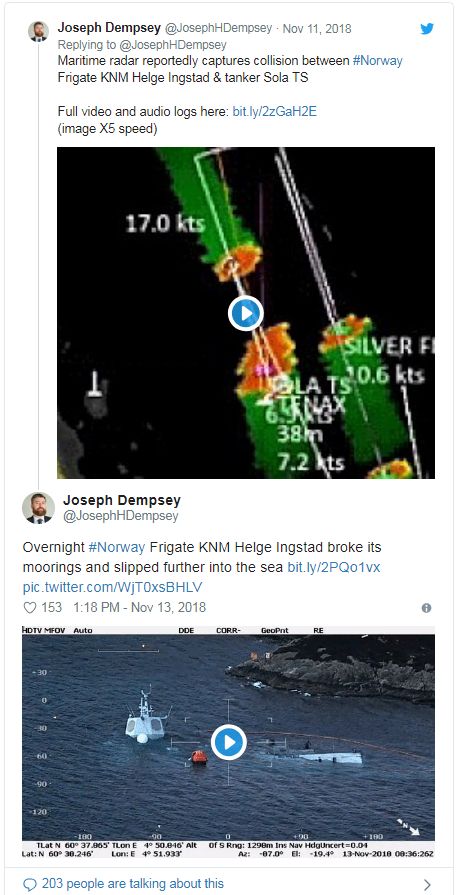FREE WEST MEDIA
The collision with the KNM Helge Ingstad left a big enough hole in the starboard side of the frigate for the warship to take on water. The crew has been forced to abandon the vessel, The Barents Observer reported. On Tuesday morning, most of the navy ship was already under water.
The warship, one of Norway’s five top modern frigates, was on her way home to Haakonsvern naval base, but it is still a mystery why the well-equipped warship couldn’t avoid colliding with the 250 meters long oil tanker just north of the oil terminal.
The weather was excellent while the waters in the area offer maritime traffic real-time shipping control. Also, there was radio-contact between the vessels when the accident happened.
The nagging question remains as to why the frigate, with all its radars and sensors, could not change course to avoid the collision.

The Armed Forces appear reluctant to speak about the crew of the KNM Helge Ingstad.
Judging by the sound record and expert statements, the crew made crude, almost incomprehensible human errors, making them look like amateurs.
“If this is how the Navy trains its naval officers, it’s shocking. They do not show any discipline or understanding of the roadmap rules, nor how to communicate or navigate at sea,” the experienced captain and navigator Geir S Eilertsen remarked.
“In the audio log, you hear the use of voice that does not seem as if the crew in the frigate is aware of the situation they are in. They are not aware that they are heading for danger,” he said.
Retired Commander Jacob Borresen, also found the collision inexplicable. “The fact that it happened in this particular area is incomprehensible. Here we have a traffic centre packed with radar monitoring equipment reading transponder signals from all the vessels in the area.
“The frigate had state-of-the-art radar equipment and infrared optical systems. How is it possible that the vessels didn’t see each other?” Borresen responded an interview with Norwegian state broadcaster NRK.
An increasing number of readers have contacted Resett pointing to previous speeches about KNM Helge Ingstad, where the publication Armed Forces had been more than willing to praise the crew.
The appointment of the crew was highly controversial at the time, especially to critics who are familiar with the inner workings and operations of the Armed Forces.
The debate had centred around the number of women in the Navy, the extent to which they are quoted in requirements compared to men, and what effect it had on the professional “culture” of the Armed Forces.
In the Norwegian magazine, Armed Forces Forum No. 2 in 2017 it was stated that “Four out of five navigators on frigate KNM Helge Ingstad are women“.
“It is advantageous to have many women on board. It will be a natural thing and a completely different environment, which I look at as positive,” Lieutenant Iselin Emilie Jakobsen Ophus said. She is a navigation officer at KNM Helge Ingstad, according to Defense Forum.
In yet another politically correct nod, the text notes that: “The Navy receives a much higher number of women after general conscription duty was introduced. Therefore, more women are also more motivated for further career opportunities in the Armed Forces.
“There has always been a perception that the Armed Forces are characterized by a very masculine environment, and in many ways it is true. It is mostly men in the Armed Forces, but it is important for me to show that you do not have to be ‘one of the guys’ to assume a role in the Armed Forces. Finding one’s place should not be at the expense of being a woman,” said Ophus.
When more women are able to work together, “it becomes easier to discover and to create a more balanced defense,” Armed Forces Forum opined.
“It is important that the integration of women should work in every aspect: from officers and constables, to people,” Ophus said, adding: “The most important thing for me is that my job makes sense because you work for something bigger than yourself.”
In the same magazine where the Norwegians boast about gender equality in their Navy, they also explained that they are looking into every department of their Armed Forces to apply the same formula.
Norway’s Ministry of Defence has not yet reported whether they plan to lift the frigate from where it sunk to repair the vessel. All the 137 people on board the KMN Helge Instad were successfully evacuated.
Not only did the demise of the uninsured frigate cost the Norwegian Navy its entire annual budget, but the country lost millions with several oil and gas fields which were temporarily shut down due to the accident.
Since the oil companies pay 78 percent taxes to the state for production, the shutdown resulted in a substantial economic loss, national broadcaster NRK reported.
The KMN Helge Ingstad is one of five Nansen-class frigates billed as “unsinkable” due to its construction with water-tight zones designed to keep the warship “intact and operable”.
The vessel had taken part a “high visibility” exercise shortly before the collision.








